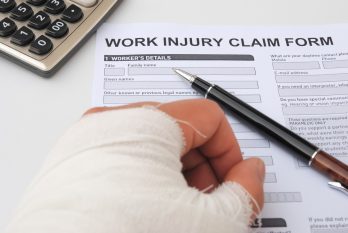Workers’ Compensation Attorneys Serving Clients in Long Branch, Shrewsbury, Spring Lake, Tinton Falls, and across Monmouth County

What is the difference between impairment and disability in New Jersey workers’ compensation law?
Legally speaking, there is a marked difference between impairment and disability, and it can mean the difference between a successful and unsuccessful workers’ compensation claim.
An impairment refers to a physical, structural problem in a person’s body – for example in a nerve or organ – that, in the case of workers’ compensation law, was brought about either immediately or over time due to an employee’s workplace fault. Impairment, then, is the physical issue.
Disability, on the other hand, refers to the functional limitations an employee will face as a result of the impairment. In other words, disability is one’s reduced capacity to complete their job or live a life equal to the status quo prior to the disability. The disabilities the employee will face at work and outside of work are taken into consideration in a workers’ compensation filing.
How are impairment and disability taken into consideration in NJ workers’ compensation cases?
Even if two individuals have faced the same impairment, their reward from a workers’ compensation court may differ based on the resulting disabilities their injury or impairment causes. For example, if one is able to recover fully because of a successful surgery and can complete the same level of work and life enjoyment that they experienced before, they will likely not receive the same benefits as someone who experienced the same impairment, but whose surgery was unsuccessful, rendering them unable to complete work or life hobbies to the same extent.
New Jersey Supreme Court case Perez v. Pantasote set the precedent that employees filing for workers’ compensation benefits must 1) prove impairment as one element of the claim but equally, they must 2) prove disability. The case ruling included as the disability not only work-related reduced capacities but also any “substantial interference with the other, non-work-related aspects of the petitioner’s life.”
As such, the plaintiff in a workers’ compensation case in New Jersey is going to have an easier time proving disability if areas of their life outside of work have been affected by the work-related impairment – that is, if their workers’ compensation attorney is skilled and can show documentation of their life before the work-related accident or impairment, and the changes to lifestyle that have had to occur as a result. Having a quality workers’ compensation lawyer makes all the difference because many commit the error of simply focusing on compiling expert views on the extent of the impairment. A medical expert who proves that the injured employee has a great deal of impairment, even 100 percent when totaled, can’t support that plaintiff from receiving a workers’ compensation benefit if a said employee has been back to work and is displaying no disability in their job as a result, or if no documentation proves that their lifestyle has become limited as a result of these extensive impairments.

Whether you are an injured employee wanting to ensure that you receive the full workers’ compensation benefits that you deserve, or you are an employer defending your company from a workers’ compensation lawsuit, it is essential that you have a skilled workers’ compensation attorney on your side.
Contact our Worker’s Compensation Attorney for a free and confidential consultation
We will work to support you while you focus on your full recovery or leading your company to safe and successful new territories.
At Chamlin, Uliano & Walsh, we are glad to successfully represent clients across Long Branch, Shrewsbury, Spring Lake, Tinton Falls, and Monmouth County. Your wellness is our first priority.
Contact our West Long Branch, NJ office at 732-440-3950 or toll-free at 888-328-9131.
